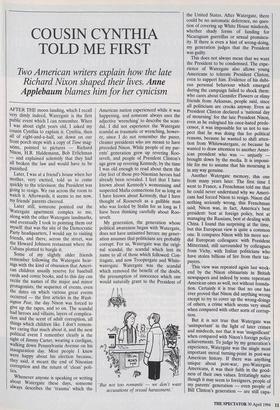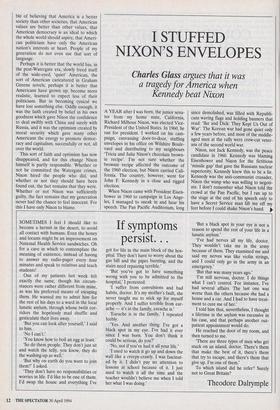COUSIN CYNTHIA TOLD ME FIRST
Two American writers explain how the late
Richard Nixon shaped their lives. Anne Applebaum blames him for her cynicism AFTER THE moon landing, which I recall very dimly indeed, Watergate is the first public event which I can remember. When I was about eight years old, I asked my cousin Cynthia to explain it. Cynthia, then all of eight-and-a-half, sat down on our front porch steps with a copy of Time mag- azine, pointed to pictures — Richard Nixon, H.R. Haldemann, Bob Erlichman — and explained solemnly that they had all broken the law and would have to be punished.
Later, I was at a friend's house when her mother, very excited, told us to come quickly to the television: the President was going to resign. We ran across the room to watch it. Afterwards, it seems to me now, my friends' parents cheered.
Later still, someone pointed out the Watergate apartment complex to me, along with the other Watergate landmarks, and eventually I took to pointing them out myself: that was the site of the Democratic Party headquarters, I would say to visiting friends, and there, across the street, was the Howard Johnson restaurant where the Cubans plotted to burgle it.
Some of my slightly older friends remember following the Watergate hear- ings with the kind of obsession that Ameri- can children usually reserve for baseball cards and comic books, and to this day can recite the names of the major and minor protagonists, the sequence of events, even the dates on which various great events occurred — the first articles in the Wash- ington Post, the day Nixon was forced to give up the tapes, and so on. The scandal had heroes and villains, layers of complica- tion and the scent of adult corruption, all things which children like. I don't remem- ber caring that much about it, and the next Political event I remember clearly is the sight of Jimmy Carter, wearing a cardigan, walking down Pennsylvania Avenue on his inauguration day. Most people I knew were happy about his election because, they said, it meant the end of Nixonian corruption and the return of 'clean' poli- tics.
Whenever anyone is speaking or writing about Watergate these days, someone always describes the 'trauma' which the American nation experienced while it was happening, and someone always uses the adjective 'wrenching' to describe the scan- dal. I did not experience the Watergate scandal as traumatic or wrenching, howev- er, since I do not remember the purer, cleaner presidents who are meant to have preceded Nixon. While people of my par- ents' generation grew up revering Roo- sevelt, and people of President Clinton's age grew up revering Kennedy, by the time I was old enough to read about them the clay feet of those pre-Nixonian heroes had already been revealed. I feel that I have known about Kennedy's womanising and suspected Mafia connections for as long as I have known about Kennedy, that I have thought of Roosevelt as a gullible man who was fooled by Stalin for as long as I have been thinking carefully about Roo- sevelt.
My generation, the generation whose political awareness began with Watergate, does not have untainted heroes: my gener- ation assumes that politicians are probably corrupt. For us, Watergate was the origi- nal scandal, the scandal which lent its name to all of those which followed: Con- tragate, and now Troopergate and White- watergate. Watergate was the scandal which removed the benefit of the doubt, the presumption of innocence which one would naturally grant to the President of 'But not too romantic — we don't want accusations of sexual harassment.' the United States. After Watergate, there could be no automatic deference, no ques- tion of covering up White House misdeeds, whether shady forms of funding for Nicaraguan guerrillas or sexual promiscu- ity. If there is even a hint of wrong-doing, my generation judges that the President was guilty.
This does not always mean that we want the President to be condemned. The expe- rience of Watergate also allows young Americans to tolerate President Clinton, even to support him. Evidence of his dubi- ous personal behaviour which emerged during the campaign failed to shock them: who cares about Gennifer Flowers or slimy friends from Arkansas, people said, since all politicians are crooks anyway. Even as President Clinton declared a 'national day of mourning' for the late President Nixon, even as he eulogised his once-hated prede- cessor, it was impossible for us not to sus- pect that he was doing this for political reasons, because he wanted to shift atten- tion from Whitewatergate, or because he wanted to draw attention to another Amer- ican president who was — unjustly — brought down by the media. It is impossi- ble for me to assume that his mourning is in any way genuine.
Another Watergate memory, this one from many years later. The first time I went to France, a Frenchman told me that he could never understand why we Ameri- cans had forced Nixon to resign. Nixon did nothing seriously wrong, this Frenchman said; Nixon was, in fact, America's best president: best at foreign policy, best at managing the Russians, best at dealing with China. I found this surprising at the time, but this European view is quite a common one. It compares Nixon with his more sor- did European colleagues: with President Mitterrand, still surrounded by colleagues from Vichy, with Italian politicians who have stolen billions of lire from their tax- payers.
This view was repeated again last week- end by the Nixon obituarists in British newspapers and indeed by some repentant American ones as well, not without founda- tion. Certainly it is true that no one has ever proved that Nixon did anything wrong except to try to cover up the wrong-doings of others, a crime which seems very small when compared with other sorts of corrup- tion.
But it is not true that Watergate was 'unimportant' in the light of later crimes and misdeeds, nor that it was 'insignificant' when compared with Nixon's foreign policy achievements. To judge by my generation's experience, Watergate was the single most important moral turning-point in post-war American history. If there was anything unique about post-war, pre-Watergate Americans, it was their faith in the good- ness of their own values. Irritatingly naive though it may seem to foreigners, people of my parents' generation — even people of Bill Clinton's generation — are still capa- ble of believing that America is a better society than other societies, that American values are better than other values, that American democracy is an ideal to which the whole world should aspire, that Ameri- can politicians have only the American nation's interests at heart. People of my generation do not even use that sort of language.
Perhaps it is better that the world has, in the post-Watergate era, slowly freed itself of the wide-eyed, 'quiet' American, the sort of American caricatured in Graham Greene novels; perhaps it is better that Americans have grown up, become more realistic, learned to expect less of their politicians. But in becoming cynical we have lost something else. Oddly enough, it was the faith created by belief in his own goodness which gave Nixon the confidence to deal swiftly with China and surely with Russia, and it was the optimism created by moral security which gave many other Americans the energy to promote democ- racy and capitalism, successfully or not, all over the world.
This sort of faith and optimism has now disappeared, and for this change Nixon himself is partly responsible. Whether or not he committed the Watergate crimes, Nixon hired the people who did, and whether or not they should have been found out, the fact remains that they were. Whether or not Nixon was sufficiently guilty, the fact remains that my generation never had the chance to feel innocent. For this I have only Nixon to blame.



























































 Previous page
Previous page